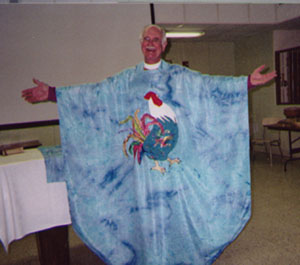This is what Blessed Pope Paul VI told Italian bishops in 1964 before Bugnini actually concocted a Liturgy that would all but undo what Blessed Paul VI envisioned in this speech. My comments imbedded in text in RED.
The liturgical reform provides us with an excellent opportunity in this regard: it calls us back to the theological view of human destiny that the action of grace, and thus of the life of the sacraments and prayer, has primacy. The liturgical reform opens up to us a way to reeducate our people in their religion, to purify and revitalize their forms of worship and devotion, to restore dignity, beauty, simplicity, and good taste to our religious ceremonies. (What was in bad taste, one can only wonder and make subjective jumps to conclusion, like Laitin? Ad Orientem? Vestments? Birrettas? And is the liturgy really about education in "their religion"? What about inspiration?) Is this the reformed liturgy's far superior good taste:
The second is that you promote sacred song, the religious, congregational singing of the people. Remember, if the faithful sing they do not leave the Church; if they do not leave the Church, they keep the faith and live as Christians. (Okay, in 2018 what can we say about the miserable eclectic state of music in the Church? What is meant by sacred song, hymns? Or the Mass itself? And we have trying to bribe, cajole and otherwise humiliate Catholics into singing at Mass or during the Mass and to what success has this kept Catholics from leaving the Church????? Has the pope's prophecy been self-defeating from the start????????)
(Address to Italian bishops, April 14, 1964)

4 comments:
The Pope was wrong on all counts. This blurb repeats the nonsense that the Liturgical Movement was putting out at the time. The LM was in full control of all the reforms then, and Paul VI simply reiterated their position....there was no other competing position in the academy.
"The liturgical reform...."
"...calls us back to...that the action of grace...has primacy." -> There was nothing to call back to. Grace was always primary unless you were a Pelagian like so many in the Church today are.
"Without such inward and outward renewal there can be little hope for any widespread survival of religious living in today’s changed conditions." -> What changed conditions? Ah, here is that fanciful concept of modern man again. Technology has changed, but the essence of man has not. But of course Modernists do not believe in essences, and if they do, not unchangeable ones (i.e evolution).
"...the participation of the people will be an occasion of the most intense involvement for all." -> Involvement in the liturgy, or involvement in deep prayer? There is a sense here that the liturgy has already become an idol. People were involved during the liturgy, but with God, bot the liturgy. You cannot expect ivory tower experts to understand the difference.
"...if the faithful sing they do not leave the Church." -> An incredible statement but that is what the LM, especially Joseph Gelineau, espoused at the time. Sing and be merry and everything will be all right, especially if you are a hymn singing Protestant.
I do not like to say this, but tThe more I read about all this nonsense put out by the LM at the time the more I am convinced that the diabolical was involved.
Most music today is an offense to the ears.
Chant is the only music that properly belongs to the Mass. It does not have to be Latin Gregorian chant. Very good music settings are available and in English too. The problem is that no one cares enough. The other thing is that music ministers see it as a performance gig and not a time of worship.
Some places even sport baby grand pianos right next to the altar where Ms. Music Minister can compete with the priest at the altar banging away with great gusto.
I'm sure that photo did wonders for vocational recruitment. Real men were likely climbing over each other to prepare for the presbyterate.
Hey, is that a photo of one of our “favorite” priests who posts here regularly?
Post a Comment